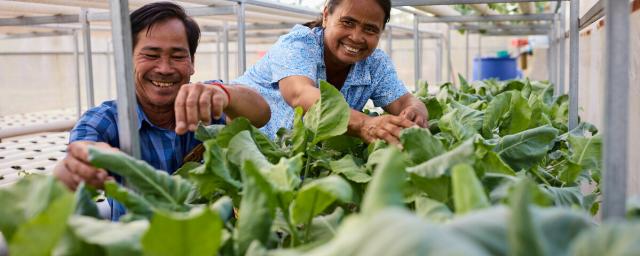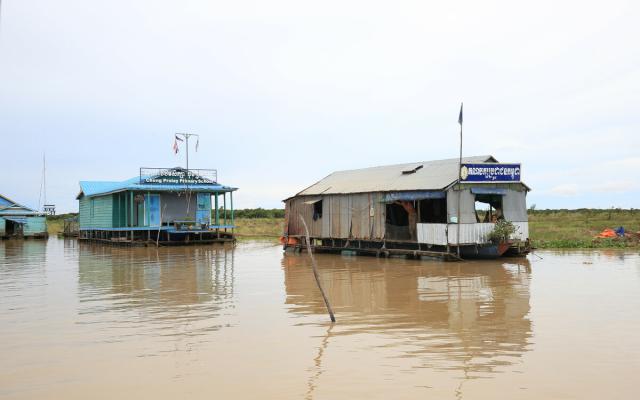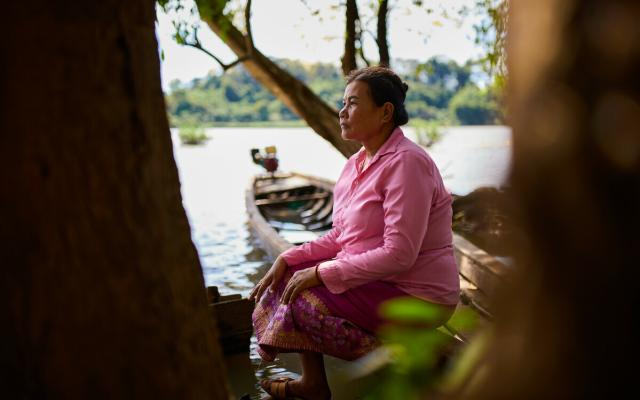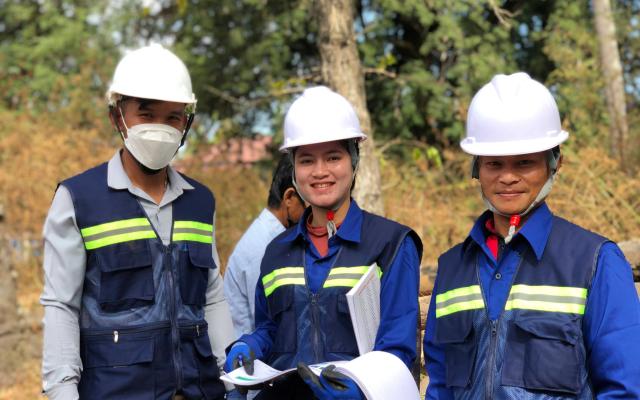
Chana and Sare are part of an aquaponics pilot project, which gives villagers the opportunity to grow vegetables in a climate resilient way that can then be used to support their household expenses. Oxfam acknowledges the support of the Australian Government through the Department of Foreign Affairs and Trade. (Photo: Patrick Moran/Oxfam)
Located in the southwest of the Indochinese Peninsula, Cambodia spans 181,035sq km, bordering Vietnam, Lao PDR, Thailand, and the Gulf of Thailand. Its landscape is mostly low plains with mountains in the North and Southwest, shaped by the Mekong River, and the three tributaries – Sesan, Srepok, and Sekong, and the Tonle Sap Lake.
Most Cambodians work in subsistence farming. The country is rich in natural resources like oil, gas, timber and minerals, and has potential for renewable energy sources like hydropower, solar, and wind. Economic growth has averaged 6% over the past decade, driven by textile, agriculture, construction and tourism, attracting foreign investment and trades.

Lack of water, deforestation, and pollution from sewage and agricultural runoff are affecting fishing families living in their floating homes along the lake and rivers flowing into Tonle Sap. Oxfam is collaborating with Fisheries Action Coalition Team (FACT) on the “Fisher folk making circular economy work on the western Tonle Sap Lake” (FOSTER) project. The schools and other structures float alongside the homes. Here, a primary school is seen next to several other buildings, all adapted to life on the water. (Photo: Banung Ou/Oxfam)
Challenges
Despite enjoying an average annual growth rate of 7.6% over the past two decades, Cambodia continues to grapple with deep-rooted challenges. The global COVID-19 pandemic triggered country's first economic contraction in 25 years.
Cambodia ranks among the most climate-vulnerable countries globally, particularly due to its geography, economy, and limited adaptive capacity. According to the 2020 Global Climate Risk Index, Cambodia was ranked 12th worldwide in terms of vulnerability to climate-related hazards — a reflection of both high exposure and limited capacity to mitigate or adapt. Climate change and extreme weather events are increasingly affecting Cambodia, compounding existing issues such as poverty, inequality, and vulnerability to climate and environmental shocks.
Nearly one in five people lives below the national poverty line, with rural and marginalized groups most affected. Climate-related disasters, including floods and droughts, are growing threats to livelihoods and further exacerbate inequalities. Climate shocks threaten food systems, increase displacement, and compound existing social and economic vulnerabilities, especially for those whose livelihoods depend on rain-fed agriculture and fisheries.

Channy is a community activist and leader. She was trained by 3SPN on advocacy, campaigning, and networking. She was part of a group that successfully championed for the protection of her local fishery. The community of Boeng Santhov Lake is facing several issues related to fisheries, illegal fishing, dams, and private companies disrupting the ecosystem in the conservation area. Oxfam acknowledges the support of the Australian Government through the Department of Foreign Affairs and Trade. (Photo: Patrick Moran/Oxfam)
Impact on People
Cambodia’s development is hindered not only by climate vulnerability and poverty but also by a set of deeply interconnected social and institutional challenges that disproportionately affect the most marginalized including women and children.
- Limited access to quality public services, particularly in health, education, and social protection, means that many Cambodians, especially in rural areas, struggle to access essential care and opportunities. This perpetuates cycles of poverty and limits upward mobility, especially for children and women.
- Gender inequality and discriminatory norms continue to restrict women’s rights, economic participation, and leadership. Despite progress, women face high rates of gender-based violence, limited access to education and healthcare, and underrepresentation in decision-making roles. These barriers reduce their ability to contribute fully to society and protect themselves from climate and economic shocks.
- Restricted civic space undermines the ability of civil society, young people, and local communities to participate in shaping policies that affect their lives. Shrinking freedoms of expression and association weaken accountability and reduce the effectiveness of grassroots responses to development and climate challenges.
- Cambodia’s fragmented social protection system leaves many behind — especially informal workers, Indigenous communities, and people with disabilities.
Oxfam’s Role
Oxfam started operations in Cambodia in 1979, responding to humanitarian crisis of the genocidal Khmer Rouge regime. By working closely with local partners and communities, we aim to build resilience and support individuals to advocate for their rights. We take an inclusive approach to development. Our work is hallmarked by the design and implementation of evidence-based development initiatives built up from the perspective of the poor and the vulnerable with the prospect of scalable and lasting results.
We provide strategic oversight, technical assistance, skills transfer, finance and administrative support to local agencies and actors that partner with us so they can champion these results. These designs are supported with ongoing research, monitoring, evaluation and learning so that we are continually working toward better practice in development.

Bunthor Moun (center), a community member in Koh Snaeng village, Stung Treng province, took part in the solar rooftop operation and maintenance training organized by Oxfam’s partner, I.M.B Cambodia. This is part of our effort to build the capacity of the community on solar operations and maintenance. (Photo: Touch Chanthan/MVi)
Our Work
Our three programs include:
- Voices for Change program focuses on the good governance of fair and accountable fiscal policies, universal social protection policies and better essential services. In addition, it seeks to promote fair workplace settings, decent work and wage opportunities, particularly for informal economy workers. It supports women, youth and marginalized groups in claiming their rights to organize themselves in networks and coalitions, participate in public debates and discussions, and advocate for equal justice.
- Inclusive Green Economy program takes a market systems-based approach incorporating a Producer Public Private Partnership (P4) methodology that seeks to empower small scale producers (SSP), vulnerable women and men in Agriculture/Aquaculture by increasing their access to markets and public services. The IGE program embraces sustainability, innovation in its approach to improve the resilience of people impacted by climate change with a focus on reducing environmental impact in Cambodia in line with the updated Nationally Determined Contribution by the Royal Government of Cambodia.
- Natural Resource Governance program empowers communities that rely on natural resource, with a particularly focus on women, youth and indigenous people in rural areas. The program aims to help these communities build their networks, respond to climate change and exercise their rights to sustainable livelihoods and development by facilitating access to and control over the fair benefits derived from natural resources (land, water, extractive, forestry and fisheries.)

Chhorvy is a community leader who developed her skills in fish catch monitoring through local partner MVi (My Village). She also conducts eco-training sessions for fellow fisherfolk, sharing her knowledge with the community. Oxfam acknowledges the support of the Australian Government through the Department of Foreign Affairs and Trade. (Photo: Patrick Moran/Oxfam)
Looking Ahead
Oxfam will continue to promote good governance of fair and accountable fiscal policies, universal social protection policies and better essential services. In addition, we will seek to promote fair workplace settings, decent work and wage opportunities, particularly for those working in the informal economy. We will support women, young people and marginalized groups in claiming their rights to organize themselves in networks and coalitions, participate in public debates and discussions, and advocate for equal justice.
We continue to strengthen communities that rely on natural resources, with a focus on women, the young, and indigenous people in rural areas. Our program aims to help these communities build their networks, respond to climate change, and exercise their rights to sustainable livelihoods and development by facilitating access to and control over the fair benefits derived from natural resources (land, water, extractive, forestry and fisheries).
We continue to take a market systems-based approach, incorporating a Producer Public Private Partnership (P4) methodology that seeks to strengthen small scale producers (SSP), women and men in Agriculture/Aquaculture by increasing their access to markets and public services.
Our program embraces sustainability, innovation in its approach to improve the resilience of people impacted by climate change with a focus on reducing environmental impact in Cambodia in line with the updated Nationally Determined Contribution by the Royal Government of Cambodia.
